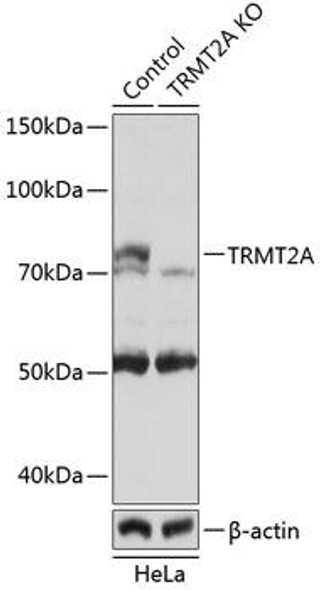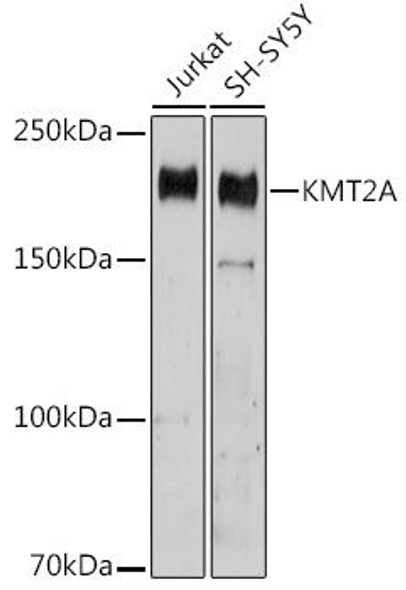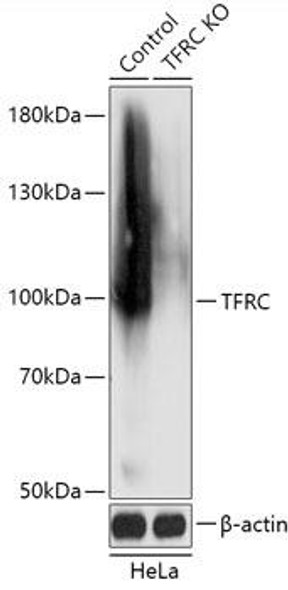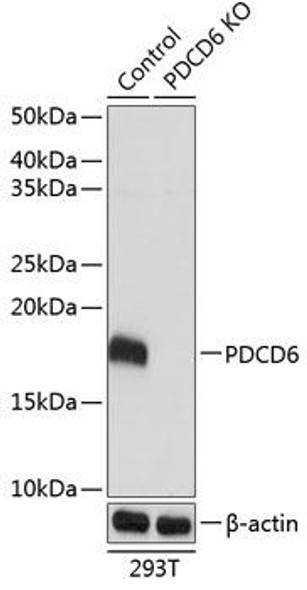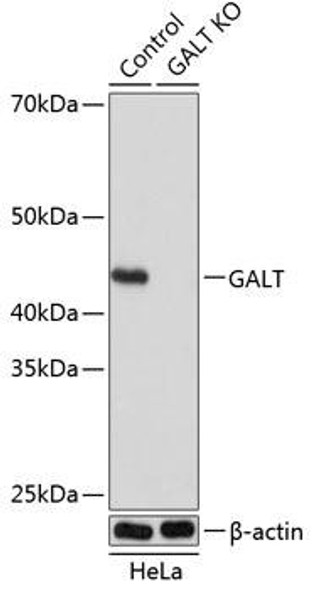Anti-BMPR2 Antibody (CAB18079)[KO Validated]
- SKU:
- CAB18079
- Product Type:
- Antibody
- Reactivity:
- Human
- Host Species:
- Rabbit
- Isotype:
- IgG
- Research Area:
- Cell Biology
Description
Anti-BMPR2 Antibody (CAB18079)[KO Validated]
The BMPR2 Polyclonal Antibody (CAB18079) is a valuable tool for researchers studying bone morphogenetic protein receptor 2 (BMPR2) in various biological processes. This rabbit polyclonal antibody is highly specific and reacts with human samples, making it suitable for a wide range of applications, including Western blotting.BMPR2 is a transmembrane serine/threonine kinase receptor that plays a critical role in signal transduction pathways involved in cell growth, differentiation, and apoptosis. Dysregulation of BMPR2 signaling has been linked to various diseases, including pulmonary arterial hypertension, cancer, and skeletal disorders.
By targeting BMPR2 with this antibody, researchers can investigate the protein's expression and activity levels in different cell types, providing insights into its physiological functions and potential therapeutic implications.Overall, the BMPR2 Polyclonal Antibody offers a reliable tool for studying BMPR2 biology and its implications in various disease states, making it a valuable asset for immunology and cancer research.
| Antibody Name: | Anti-BMPR2 Antibody [KO Validated] |
| Antibody SKU: | CAB18079 |
| Antibody Size: | 20uL, 50uL, 100uL |
| Application: | WB IF |
| Reactivity: | Human |
| Host Species: | Rabbit |
| Immunogen: | Recombinant fusion protein containing a sequence corresponding to amino acids 27-150 of human BMPR2 (NP_001195.2). |
| Application: | WB IF |
| Recommended Dilution: | WB 1:500 - 1:2000 IF 1:50 - 1:200 |
| Reactivity: | Human |
| Positive Samples: | HeLa |
| Immunogen: | Recombinant fusion protein containing a sequence corresponding to amino acids 27-150 of human BMPR2 (NP_001195.2). |
| Purification Method: | Affinity purification |
| Storage Buffer: | Store at -20°C. Avoid freeze / thaw cycles. Buffer: PBS with 0.02% sodium azide, 50% glycerol, pH7.3. |
| Isotype: | IgG |
| Sequence: | SQNQ ERLC AFKD PYQQ DLGI GESR ISHE NGTI LCSK GSTC YGLW EKSK GDIN LVKQ GCWS HIGD PQEC HYEE CVVT TTPP SIQN GTYR FCCC STDL CNVN FTEN FPPP DTTP LSPP HSFN RDET |
| Gene ID: | 659 |
| Uniprot: | Q13873 |
| Cellular Location: | Cell membrane, Single-pass type I membrane protein |
| Calculated MW: | 59kDa/115kDa |
| Observed MW: | 100kDa |
| Synonyms: | BMPR2, BMPR-II, BMPR3, BMR2, BRK-3, POVD1, PPH1, T-ALK |
| Background: | This gene encodes a member of the bone morphogenetic protein (BMP) receptor family of transmembrane serine/threonine kinases. The ligands of this receptor are BMPs, which are members of the TGF-beta superfamily. BMPs are involved in endochondral bone formation and embryogenesis. These proteins transduce their signals through the formation of heteromeric complexes of two different types of serine (threonine) kinase receptors: type I receptors of about 50-55 kD and type II receptors of about 70-80 kD. Type II receptors bind ligands in the absence of type I receptors, but they require their respective type I receptors for signaling, whereas type I receptors require their respective type II receptors for ligand binding. Mutations in this gene have been associated with primary pulmonary hypertension, both familial and fenfluramine-associated, and with pulmonary venoocclusive disease. |
| UniProt Protein Function: | BMPR2: a serine/threonine-protein kinase receptor for bone morphogenetic protein (BMP). Binds to BMP-7, BMP-2 and, less efficiently, BMP-4. Binding is weak but enhanced by the presence of type I receptors for BMPs. On ligand binding, forms a receptor complex consisting of two type II and two type I transmembrane serine/threonine kinases. Type II receptors phosphorylate and activate type I receptors which autophosphorylate, then bind and activate SMAD transcriptional regulators. Defects in BMPR2 are the cause of primary pulmonary hypertension (PPH1), a weakly penetrant dominant disorder, associated with lesions in pulmonary arterioles, elevated pulmonary arterial pressure, and right ventricular failure. |
| UniProt Protein Details: | Protein type:EC 2.7.11.30; Kinase, protein; Cell cycle regulation; Protein kinase, TKL; Membrane protein, integral; Protein kinase, Ser/Thr (receptor); TKL group; STKR family; Type2 subfamily Chromosomal Location of Human Ortholog: 2q33-q34 Cellular Component: extracellular space; cell surface; cell soma; integral to plasma membrane; apical plasma membrane; dendrite; cytoplasm; plasma membrane; basal plasma membrane; caveola Molecular Function:transforming growth factor beta receptor activity; protein binding; growth factor binding; metal ion binding; activin receptor activity, type II; ATP binding; receptor signaling protein serine/threonine kinase activity Biological Process: limb development; transcription from RNA polymerase II promoter; regulation of lung blood pressure; activin receptor signaling pathway; protein amino acid phosphorylation; anterior/posterior pattern formation; BMP signaling pathway; proteoglycan biosynthetic process; lymphangiogenesis; transmembrane receptor protein serine/threonine kinase signaling pathway; positive regulation of BMP signaling pathway; negative regulation of systemic arterial blood pressure; chondrocyte development; positive regulation of bone mineralization; cellular response to starvation; negative regulation of vasoconstriction; regulation of cell proliferation; positive regulation of osteoblast differentiation; mesoderm formation; positive regulation of axon extension involved in axon guidance; positive regulation of endothelial cell proliferation; blood vessel remodeling; brain development; negative regulation of cell growth; vascular endothelial growth factor receptor signaling pathway; alveolus development Disease: Pulmonary Venoocclusive Disease 1, Autosomal Dominant; Pulmonary Hypertension, Primary, 1 |
| NCBI Summary: | This gene encodes a member of the bone morphogenetic protein (BMP) receptor family of transmembrane serine/threonine kinases. The ligands of this receptor are BMPs, which are members of the TGF-beta superfamily. BMPs are involved in endochondral bone formation and embryogenesis. These proteins transduce their signals through the formation of heteromeric complexes of two different types of serine (threonine) kinase receptors: type I receptors of about 50-55 kD and type II receptors of about 70-80 kD. Type II receptors bind ligands in the absence of type I receptors, but they require their respective type I receptors for signaling, whereas type I receptors require their respective type II receptors for ligand binding. Mutations in this gene have been associated with primary pulmonary hypertension, both familial and fenfluramine-associated, and with pulmonary venoocclusive disease. [provided by RefSeq, Jul 2008] |
| UniProt Code: | Q13873 |
| NCBI GenInfo Identifier: | 15451916 |
| NCBI Gene ID: | 659 |
| NCBI Accession: | NP_001195.2 |
| UniProt Secondary Accession: | Q13873,Q16569, Q4ZG08, Q53SA5, Q585T8, |
| UniProt Related Accession: | Q13873 |
| Molecular Weight: | 115,201 Da |
| NCBI Full Name: | bone morphogenetic protein receptor type-2 |
| NCBI Synonym Full Names: | bone morphogenetic protein receptor, type II (serine/threonine kinase) |
| NCBI Official Symbol: | BMPR2 |
| NCBI Official Synonym Symbols: | BMR2; PPH1; BMPR3; BRK-3; T-ALK; BMPR-II |
| NCBI Protein Information: | bone morphogenetic protein receptor type-2; BMPR-2; BMP type-2 receptor; BMP type II receptor; type II activin receptor-like kinase; bone morphogenetic protein receptor type II; type II receptor for bone morphogenetic protein-4 |
| UniProt Protein Name: | Bone morphogenetic protein receptor type-2 |
| UniProt Synonym Protein Names: | Bone morphogenetic protein receptor type II |
| Protein Family: | Bone morphogenetic protein receptor |
| UniProt Gene Name: | BMPR2 |
| UniProt Entry Name: | BMPR2_HUMAN |


![Anti-BMPR2 Antibody [KO Validated] (CAB18079)](https://cdn11.bigcommerce.com/s-h68l9z2lnx/product_images/m/415/A18079_1__71170.jpg)


